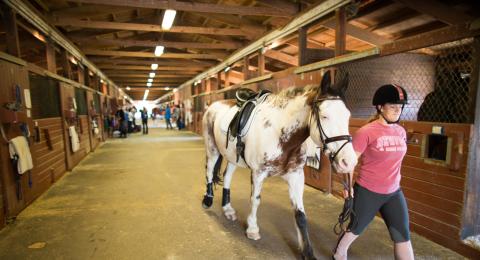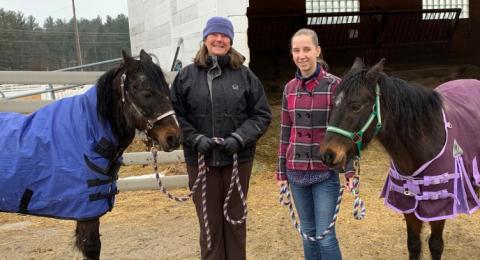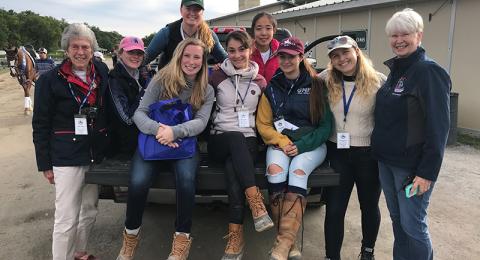What is the equine-assisted activities and therapies minor?
Equine-assisted activities and therapies (EAAT) are dynamic treatments that focus on the frequent, rhythmic, low-amplitude movement of horses to help individuals achieve specific physical, cognitive, social and emotional goals. The minor in program provides students with exposure to several disciplines within this diverse field. The required courses introduce students to key concepts in equine handling and EAAT, including equine skills and the opportunity to test for PATH International CTRI instructor certification in therapeutic riding.
Why study equine-assisted activities and therapies at UNH?
UNH is one of a handful of PATH Intl. Level III Higher Education Centers. Through the PATH Intl. Premier Accredited UNH Therapeutic Riding Program, undergraduates have the opportunity to work with individuals who have physical, emotional and cognitive disabilities and learn how to create an environment that integrates members of the disabled and able-bodied communities. Students in the program can earn their Professional Association of Therapeutic Horsemanship International instructor certification, which enables them to teach at any PATH International operating center in the world. Students have daily opportunities to work with horses in numerous facilities that are located within a 10-minute walk from campus.
Potential career areas
- Counselor for mental health or youth at risk
- Veteran's programming
- Fundraiser
- Nonprofit manager
- Hippotherapy
- Therapeutic riding instructor
- Therapeutic riding center manager
- Volunteer coordinator
Curriculum & Requirements
The equine studies minor supports students' interest in horsemanship while also getting an introduction to equine science, equine industry and management, and equine assisted services. You’ll be able to explore equine care and management, equine health, and equine anatomy while also working with horses to develop professional equine skills. Compliment any major with a minor in equine studies to expand your studies and/or possibilities for an equine-related career.
Students wanting to declare a minor in Equine Science must do so on Webcat by their Junior year. It is advisable to meet with the Minor coordinator in advance of this to verify your curriculum choices.
Academic policies related to Minors.
A minor in equine studies consists of a minimum of 20 credits of equine-related animal science courses.
- ANSC 402 may be counted only once for minor credit.
- Students must receive a minimum grade of C- in any course used for the minor. Students failing to do this will need to retake the course in order to receive credit.
- No courses taken on a pass(credit)/fail basis may count toward the minor.
- No more than 12 credits at the 400-level may be used for the minor.
- Students may petition equine faculty in their junior year to include a course that is not listed.
- Students must take at least one course at the 600- or 700-level.
- Students who transfer from other institutions may petition the equine program faculty for course approval.
- Students who choose both ANSC 500 and ANSC 643 as two of their courses toward the minor in equine studies will be eligible for PATH International therapeutic riding instructor certification.
| Code | Title | Credits |
|---|---|---|
| Required Course | ||
| ANSC 427 | Introduction to Equine Science | 4 |
| Electives | ||
| Select a minimum of 16 credits from the following: | ||
| AAS 434 | Equipment and Facilities Management | 3 |
| ANSC 402 | Horsemanship Lab | 1 |
| ANSC 419 | Horse Power | 4 |
| ANSC 500 | Equine Assisted Services | 4 |
| ANSC 522 | Ethical Horsemanship - Considerations and Theory | 3 |
| ANSC 526 | Equine Conformation, Movement, and Performance | 4 |
| ANSC 536 | Preparation and Competition Techniques for the Modern Sport Horse | 4 |
| ANSC 538 | Equine Handling/Longeing | 1 |
| ANSC 548 | Agricultural Business Management | 4 |
| ANSC 640 | Principles of Riding Instruction | 4 |
| ANSC 641 | Principles of Dressage Instruction | 2 |
| ANSC 642 | Principles of Jumping Instruction | 2 |
| ANSC 643 | Principles of Therapeutic Riding Instruction | 4 |
| ANSC 647 | Equine Stable Management | 4 |
| ANSC 665 | Agricultural & Equine Event Design, Planning and Management | 2 |
| ANSC 695 | Supervised Teaching Experience 1 | 1-2 |
| ANSC 724 | Reproductive Management and Artificial Insemination | 4 |
| ANSC 795 | Investigations 1 | 1-4 |
| ANSC 795W | Investigations 1 | 1-4 |
| ANSC 799 | Honors Senior Thesis 1 | 1-4 |
- 1
Subject to approval. Must be equine-related.








